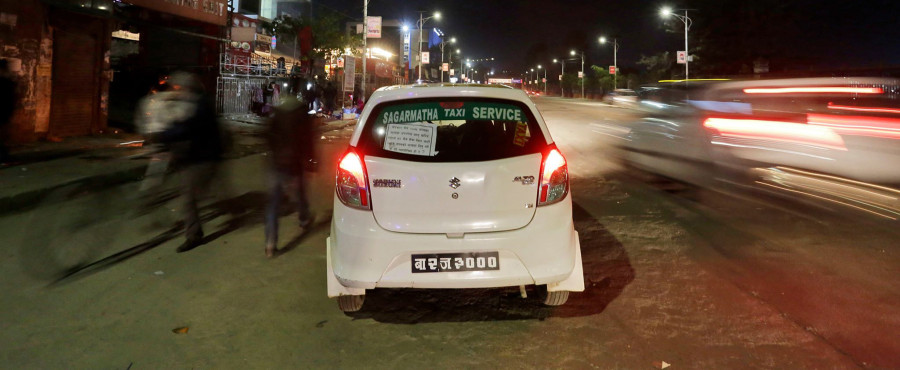Valley
After traffic police take down pamphlets, cabbies accuse state of restricting freedom of expression
Following a government crackdown on their silent protest, taxi drivers who are demanding scientific fare revision through pamphlets pasted on their rear windshields for the past three months say the government’s move is autocratic and curtails their right to freedom of expression.
Anup Ojha
Following a government crackdown on their silent protest, taxi drivers who are demanding scientific fare revision through pamphlets pasted on their rear windshields for the past three months say the government’s move is autocratic and curtails their right to freedom of expression.
In the past three days, traffic police officers in the Capital have been accused of using force and tearing the pamphlets off taxis following a memo from the Department of Transport Management on March 25.
The department had instructed the Metropolitan Traffic Police Division to rid the taxis of the pamphlets.
In the department’s words, the pamphlets sent a ‘misleading message’ to the public and are merely tools of ‘emotional blackmail’. But taxi operators say the government’s move is against the spirit of democracy.
“We are not disseminating misleading messages. We have put our demands in written form, but the government’s move clearly curtails our right to express our problem,” said Nepal Metre Taxi Association chairman Arjun Prasad Gautam.
Following the government crackdown, many taxi drivers have taken down their pamphlets fearing action from officers.
“The officers are on duty everywhere on the roads. If we do not follow their instructions, they will seize our documents,” said taxi driver Suvam Kandel.
“I removed the pamphlet to spare myself from hassles.”But Division spokesperson Jay Raj Sapkota says the officers are only implementing the department’s action and have not used force.
“We have been requesting drivers to take the pamphlets down and have not used force as accused by the taxi drivers,” he said. Meanwhile, the transport management department’s director general Kumar Prasad Dahal said that a four-member committee under technical director Prem Singh is reviewing the demands of the taxi drivers and a meeting with delegates from the taxi association was held on Tuesday.
“We don’t want the public to get a wrong message. The government has done some good work. We instructed the division accordingly,” he said.
On their pamphlets, which have received maximum attention and mixed criticisms, taxi drivers have demanded that the government revise taxi fares and also adjust the flag down rate-the base fare-of Rs14, as it is ignored operating costs, loan interests and increased taxes.
“The government is indirectly telling us to rob people and is forcefully suppressing our concerns. If we work at the existing rates, it will be hard for us to sustain ourselves,” said taxi driver Ajay Lama.
Lama, who has a family of four including two school-going children, says their difficult situation could find a solution only if the government came up with a scientific rate.
“Taxes are up from Rs7,000 to Rs13,000. Other operating costs have risen too. We can’t survive under existing rates because they are too low,” he said.
The government last revised the taxi fares in autumn 2018 when the rate had been calibrated at Rs39 per kilometre, but taxi drivers say the revision is not scientific and ignores other indicators that should be taken into account while reviewing fares.
“Based on the government’s calculations, 35 percent of fare adjustment is determined by the price of fuel, while the remaining 65 percent is based on vehicle price, interest rates of loan and inflation adjustments,” Gautam told the Post.
“Last year, the government had committed to conduct a scientific revision by mid-December, but we have been fooled. It is now using force and suppressing our peaceful protest,” he said.
Article 16 to Article 47 of the constitution guarantees 31 fundamental rights to citizens, including freedom to live with dignity and freedom of speech and expression among other fundamental human rights.
The government’s crackdown on the silent protest by taxi drivers is against freedom of speech and expression, according to advocate Om Prakash Aryal.
“Earlier, taxi drivers resorted to violent tactics, but this time, they have come up with a creative way to put forth their demands. They should be appreciated,” he said.




 18.95°C Kathmandu
18.95°C Kathmandu.jpg)













